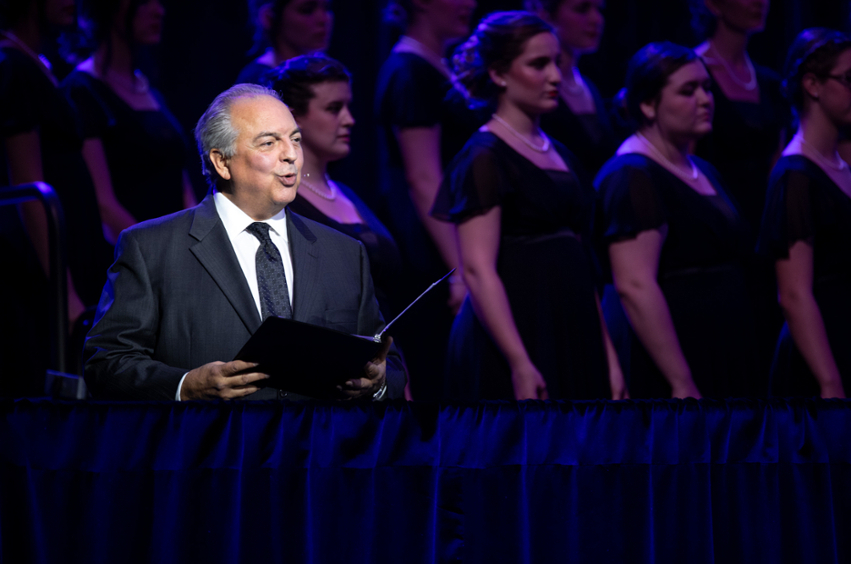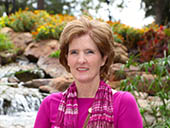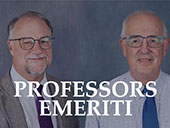Dr. Bob Brooks: Glorifying Christ through the Musical Arts
This article is over six months old and may reference former titles for DBU faculty or staff, discontinued programs, or other details that have since changed. If you have any questions, please contact us at news@dbu.edu, or (214) 333-5172.

Ebenezer Scrooge watched the Bob Cratchit family in the candlelight of their home. It is a familiar scene to anyone who knows the classic Charles Dickens novel, A Christmas Carol, or any of its numerous film adaptations.
But instead of watching with a ghost nearby, this "Scrooge" watched from the wings of a stage as Dr. Bob Brooks and his castmate from the show, Camille, played the parts of Bob and Mrs. Cratchit with the common link of being Christians in real life and some of the only Christians in the traveling musical production's cast.
"It was a very diverse cast, in a beautiful retelling of the story with music," Dr. Brooks recalled. "Camille and I were rehearsing a poignant scene with the Cratchit family gathered by candlelight. The man who played Scrooge watched in the back. We finished the scene, and he was back there sobbing uncontrollably. He said, 'I've played Scrooge many times, but I've never seen that scene so beautifully presented. It captured me.'"
Brooks realized that who he and Camille were as Christians was infused into that scene, bringing it to a higher level. "It impacted someone who was not entirely unlike Scrooge. He was a very hard person."
This moment was only the prelude to a life dedicated to the arts, a field that's often perceived as a tricky one for Christians; but unnecessarily feared, as Brooks might tell you, for it is a field where he believes Christians are needed most, and where Christ can be most seen in the quality and beauty of storytelling.
Just last year, during holy week, Dr. Brooks oversaw a dramatic Easter production by members of the DBU community students and faculty in Pilgrim Chapel.
"Students have gifts in those areas," Brooks said. "How do we use them to be citizens of the arts for society? How do we infuse that into the church today? How do we get good drama into the church? The church is pretty good at using music; but if someone is a gifted dancer, visual artist or actor, how do we use it in that way? It's different from a skit you do at youth camp. Great drama has with it great change."
The church's musical influence was what planted the seeds of an incredible, unexpected artistic career for Dr. Brooks.
A self-proclaimed "native Dallas-ite," born at Baylor Hospital and growing up in the area, he later moved to Richardson for the remainder of his young life. His parents were both teachers in the school district. When summers off came around, the family would work alongside their cattle-rancher grandparents.
"I had the best of both worlds: country and city," Brooks said. All the while, the churches he attended - Park Cities first, then Richardson Heights Baptist cultivated a talent for music and a passion for ministry in him. Initially, he defied everyone's expectations by wanting to pursue medicine when he attended Baylor University. Yet after praying and reflecting on the talents people consistently saw in him, he realized that ministry was his true vocation, and it was in the medium he knew best: music.
Brooks earned a degree in voice and a degree in music education, then got his master's in music at seminary. After working briefly for a church, Brooks pursued yet another degree: a doctorate in musical arts. He intended to immediately return to working for a church or teaching in a university.
Yet every door for work closed, so Brooks decided to delve into musical theater and joined a national tour playing Bob Cratchit in the musical adaptation of A Christmas Carol.
During their travels through the eastern seaboard, a castmate encouraged Brooks with all of his degrees and lingering passion to teach to apply to Julliard's professional internship program. So he did; and to his shock, he got accepted.
New York City would become a consistent docking point in the exciting, unprecedented career that took off for Brooks with this internship. He worked under the dean at the time, Steven Clapp.
"He was a brilliant violinist and one of the finest Christian men I have ever met," Brooks said. "Of all things, God put me in that place, at that time, with that wonderful mentor."
After proving his capabilities for a year, Julliard hired him as the associate director of educational outreach. He dealt with each department of music, dance and drama, instilling a sense of ministry-like service all the while.
One such program that fostered serving the community was the Gluck Fellowship. The student groups accepted into this exclusive program would give five performances throughout the year in New York City's hospitals, hospices and homeless centers.
"The students learned to be interactive, and the community was greatly blessed," Brooks said. By the time he left Julliard, Brooks had overseen about 350 performances.
Brooks then went on to Hardin-Simmons University to become their first full-time church music professor.
Later, upon connecting with then-DBU president Dr. Gary Cook through a mutual seminary friend, he came to DBU as the associate dean and dean of Fine Arts.
Before long, Julliard came calling again this time, to hire Dr. Brooks as the director of educational outreach. He accepted and served in this position for three years.
"Unexpected things happen in life that can change its direction; my dad suddenly died while my family was up at the ranch." Brooks returned to Texas to take care of the ranch and his mother, grandmother and sister left behind.
During this time, Dr. Cook again offered Brooks a chance to return to DBU; this time, to oversee the M.A. degree in worship leadership at the newly formed Graduate School of Leadership.
Brooks briefly returned to Hardin-Simmons as Dean of Fine Arts for a few more years. Then he came back to DBU to help form the Graduate School of Ministry, over which he has been presiding as dean for the last seven years.
"Truly, bloom where you're planted," Brooks said of his dizzying but exhilarating professional journey. "It's all been an unplanned journey. After graduating from seminary, I thought I'd be a minister of music at a local church for 40 years. It didn't happen that way. It happened a wonderful way."
Brooks cited Colossians 3:16-17 as one of his primary Scriptures that inspires him to enhance Christian students' pursuits of the arts, and to combat the common stigma of good message at the expense of good quality.
"Preparing well to serve in the 21st century church is quite a task," Brooks said. "It's from our Creator God that your unique creative gifts come from. You've got to explore those and do hard work. The entertainment industry needs light. Go in, and make a difference."
Jordan Jarrett was a member of University Communications at Dallas Baptist University.








